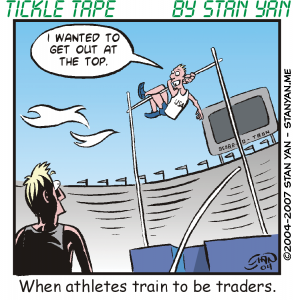Losses and setbacks are a fact of life. It is necessary to experience setbacks and recover from them in order to achieve success. The trader who has never experienced a severe drawdown, or blown out his or her trading account, has never learned to realize the worst-case scenario and recover from it. Setbacks, even severe ones, can be important learning experiences and opportunities for growth. It is vital to extract a lesson from past mistakes and learn to turn a negative event into a positive event. That said, it is important not to become paralyzed by setbacks. Rather than mull over past defeats, or trading losses, winning traders use the setback as a motivator, an opportunity to hone their skills and improve. They examine what they did wrong, learn from their mistakes, and view the temporary setback as a new and refreshing starting point from which to achieve higher levels of future performance.
Winning traders don’t get been bogged down with self-doubt, regret, and defeat. Instead, they use the “loss” as a motivator for change and improvement. They examine their past “losing” performance in scrupulous detail, discover the factors associated with poor performance, and correct these factors. They aren’t afraid of taking a brutally honest look at themselves. Indeed, they welcome it. After closely examining the facts, they can’t wait to experience new opportunities to hone their skills until they eventually achieve lasting success.
As traders, it’s crucial that you keep accurate records of all factors that may impact the outcome of your trades so that you can learn from your losses, improve your performance, and do better next time. From a psychological viewpoint, document factors associated with the loss, such as whether you were in a bad mood or acting on impulse rather than with a calm and relaxed trading style.
Other factors, such as market conditions, trading strategy, preparation for the trade (such as backtesting), or risk management strategy should also be noted. Armed with this knowledge, one can study a series of losing trades and identify the factors that led to the trades “going wrong.” One can then change these factors in subsequent trades and monitor improvement. The key is to take an upbeat psychological approach. Rather than mulling over one’s failure, it’s more useful to view past failure as an opportunity to grow and improve.
Viewing a loss as a growing experience changes your perspective immediately. You will now focus on what you can do to achieve the bigger goal of becoming a seasoned trader, rather than mulling over the loss from a few of the many trades you will make throughout your career. In the end, it is essential to keep the bigger picture at the forefront. You’ll be a successful trader in the long run if you just keep honing your skills. By monitoring the factors associated with poor performance, and changing these factors in future trades, you can learn from your mistakes and trade profitably and consistently.


